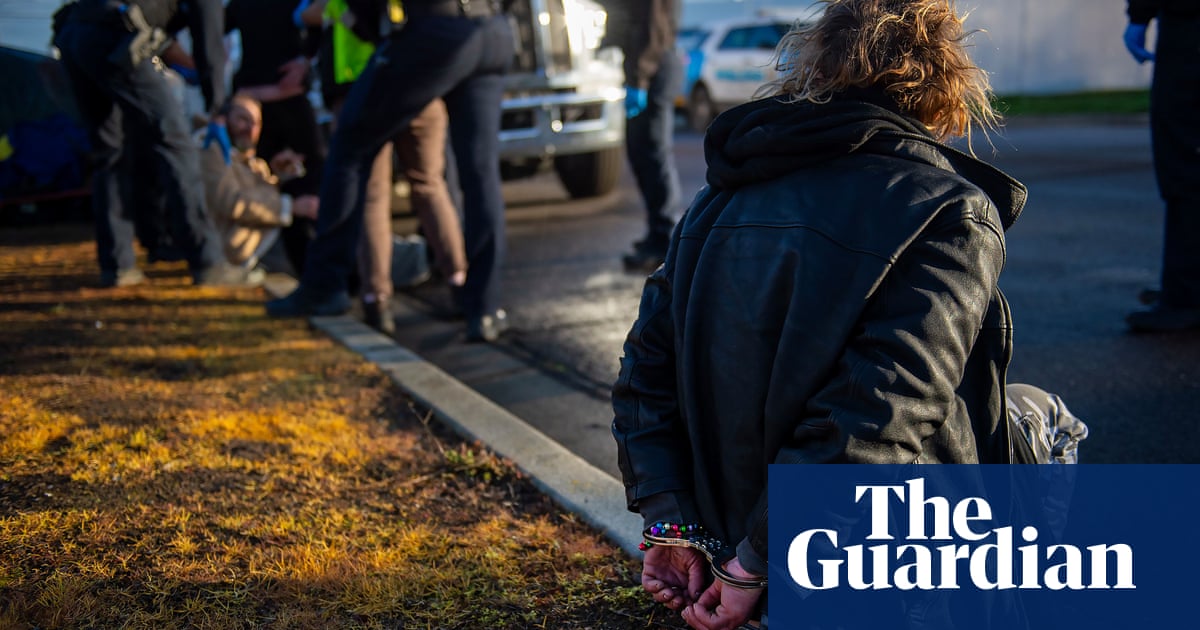In September, Oregon lawmakers enacted legislation turning low-level drug possession into a more serious crime punishable by up to 180 days in jail. The resulting crackdown has led to thousands of arrests statewide in recent months. People targeted in cities such as Medford, and overworked public defenders tasked with representing them, say the drug enforcement has been chaotic and at times brutal.
While the new policy has appeared to reduce visible drug use in some public spaces, unhoused people, who have been most impacted by the police response, say it has exacerbated their struggles.
…
The Medford police department has led the state in drug criminalization – by a lot.
The city is located in a region near the California border that is one of the more conservative areas of a blue state; more than half of voters in Jackson county, which includes Medford, supported Donald Trump.
From September, when the new law was enacted, through 26 March, the Medford police force carried out 902 drug possession arrests – more than double the number of cases in Portland (a city with seven times the population). Jackson county has logged 1,170 arrests total.
Verling, an officer on the city’s “livability” team, a unit focused on low-level crimes, including unlawful camping, trespassing, public drinking and drug possession, said many police were relieved when drugs were recriminalized. The 2020 reform had led to increasing reports of drug use on the streets and growing concern about public intoxication.
Recriminalization, Verling said, allows him to engage people in hopes of pushing them to treatment. “I really don’t want to see someone go to prison … but this gives us the ability to get back into their lives,” he said on a recent patrol through Medford.
He said the job was most rewarding when seeing someone turn their life around after they’ve been jailed – and when his team arrests dealers, potentially “making people sober by making the drugs inaccessible”.
One of the livability team’s main priorities has been clearing homeless encampments, and as Verling drove his patrol car onto a pedestrian greenway, the impact was clear. During the pandemic, encampments were a common site. Now, there were few visible signs of homelessness. Several locals were jogging.
Where did people go?
“People leave town. They’re like, ‘OK well it’s a crime to camp here,’” he said, adding he believed many were in shelters.
…
Jackson county designed its program so officers could directly hand over arrestees to drug treatment programs instead of jail, a collaborative approach meant to get people immediate help without involving the courts. But many don’t qualify, aren’t offered this alternative during their arrest, or they decline an officer’s offer. According to the latest available data, while there have been nearly 1,200 possession arrests, as of 27 March, only 69 people have been referred to deflection.
Instead, many get arrested. And rearrested. One 43-year-old unhoused woman said police were “acting like every person on the street is a drug addict, which is not true”, and that she had been arrested four times by Medford’s livability team since October, generally for camping violations. While she was quickly released after her last arrest, her partner was not, leaving her to camp outside alone. The woman, who asked not to use her name out of fear of police retaliation, said she was sleeping in front of a social services center in hopes her partner could easily find her when he gets out. “The separation makes me feel like I can’t breathe,” she added. “Police say they’re helping the homeless, but they’re just throwing us in handcuffs and jail.”



Prove it. Show me studies that jail time is an effective deterrent to drug use. Peer reviewed, actual research.
I’ve worked with former addicts for many, many years; I have never had one of them tell me that jail got them straight, but I have had many tell me they came out of jail more addicted than they went in.
As noted elsewhere in this thread…
Under Measure 110, the rate of people asking for help was less than 1% when the alternative was an optional $100 ticket.
When the choice is “get help or jail” it’s now 7%.
The threat of jail is 7x more effective.
You might be surprised by this, but nowhere in your response did you include links to peer reviewed research projects supporting your position.
Already up thread from here. Do try to keep up.
You know what man, my bad here. I have a general policy of not digging through comment histories to make judgements about people, but I saw a comment about you pulling this same shit about BLM so I went and had a look.
It’s clear to me now that you’re a low effort troll, and like, just a general chode. I hope you can fix whatever it is that makes you this way and I hope you can live a better life but I won’t waste my time with this anymore.
I’m so sorry my desire to have a livable city doesn’t meet your personal standards. We ARE getting there!